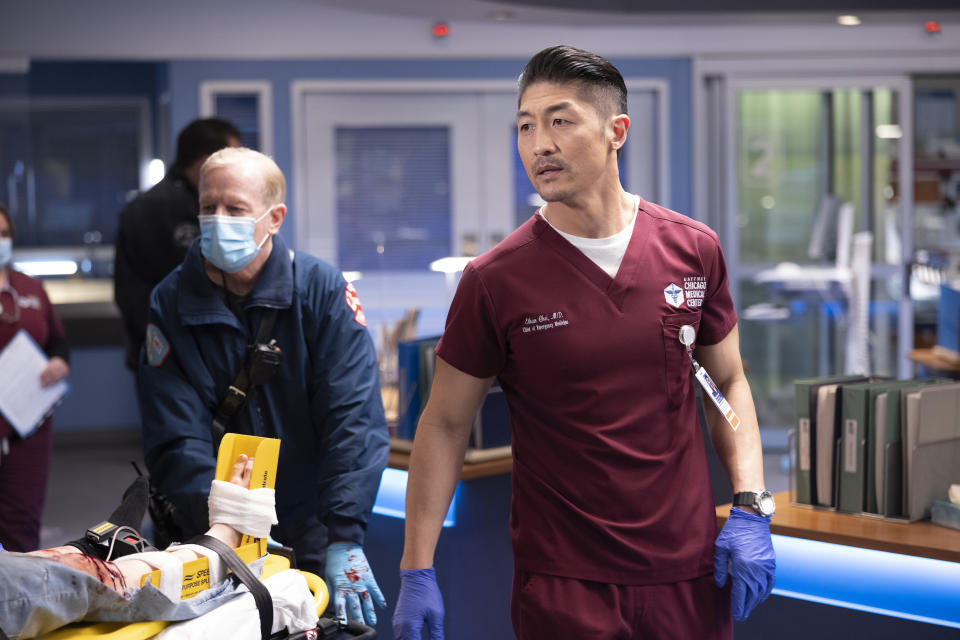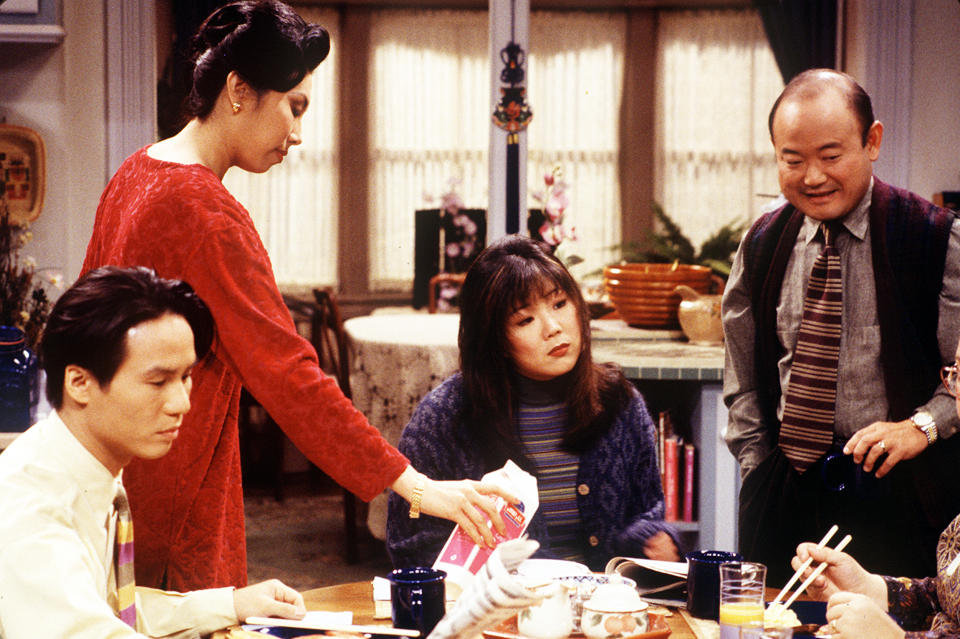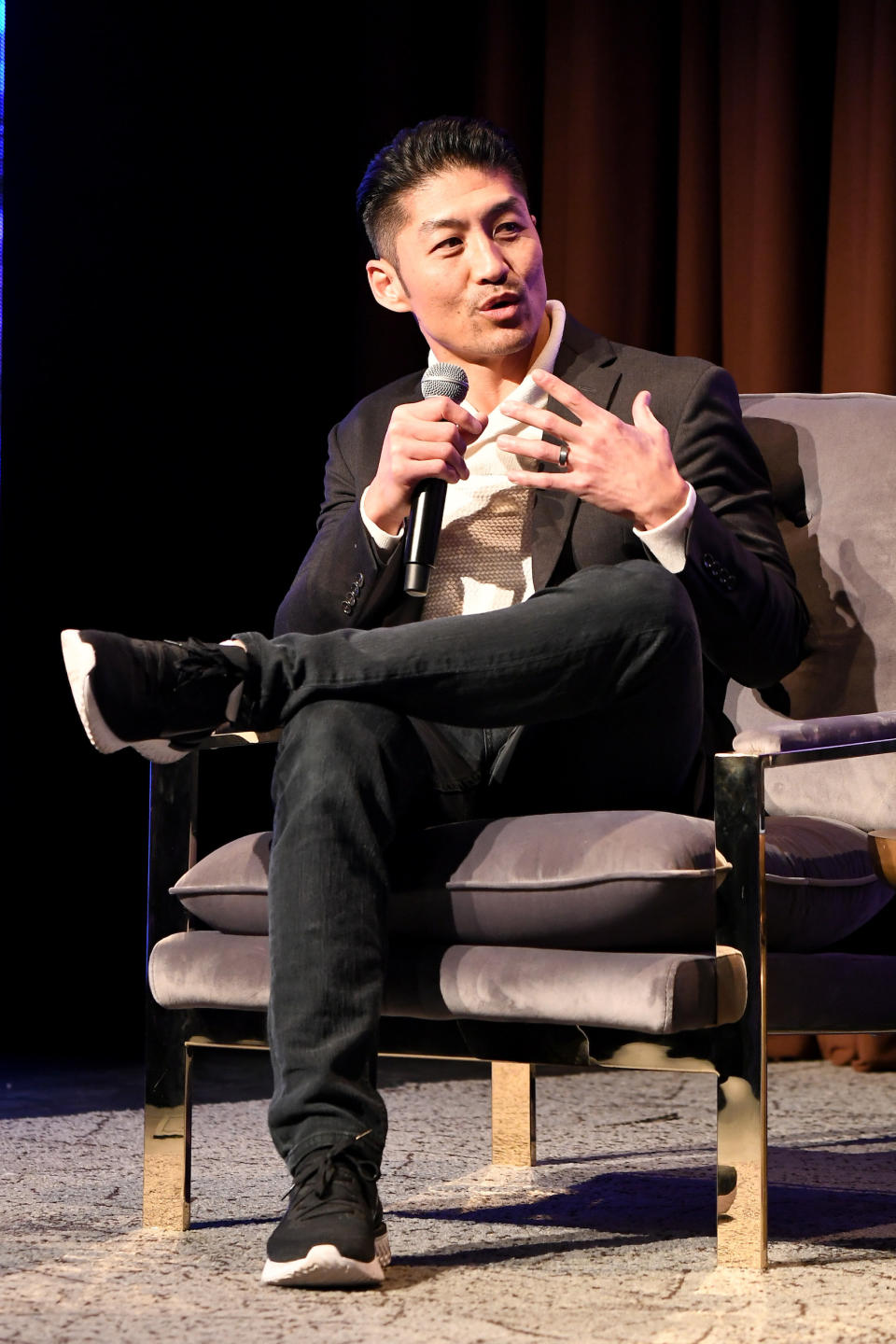‘Chicago Med’ star explains why he changed his last name to work in Hollywood
- Oops!Something went wrong.Please try again later.
More than 6,000 miles separate Okinawa City, Japan, from Hacienda Heights, California — two vastly different cities, yet both meaningful to actor Brian Tee.
When the 45-year-old — known for his roles in “The Fast and the Furious: Tokyo Drift” and “Chicago Med” — was 2 years old, he moved from the island to the suburb located 20 miles east of Los Angeles. Tee has fond memories of growing up in his “bubble” filled with a range of cultures that “put me in this oddly wonderful environment to kind of grow,” the Asian American actor told TODAY via Zoom.
Tee credits his multicultural environment to his own fusion of cultures. His mother is first-generation South Korean, and his Japanese American father, who grew up in Los Angeles, was born in a U.S. incarceration camp during World War II.
“It just allowed me to be very open and broad with all cultures and all environments,” Tee said of his upbringing. “But I was never really ‘othered’ for my race. I never felt ‘othered’ for the way that I looked.”
That all changed when he decided to become an actor — a career choice his parents “didn’t want” for him, but supported.
“My parents were supportive of me wanting to explore new things. But in the end, and in the back of their minds, they wanted me to be a successful businessman or doctor, lawyer,” he explained. “Because as an immigrant ... especially being an Asian immigrant, those are the heights of where you want your children to be.”
He added: “So being an artist, being an actor wasn’t even in the books for them. So when I started, it was a little tough."
While his parents allowed him to pursue his passions, his mom didn’t think he would make it an actual career. Even to this day, with more than 70 credits to his name, he joked that she recently told him he still had time to become a lawyer.

“My wife (actor Mirelly Taylor) and I were sitting watching an episode of ‘Chicago Med’ and my mom entered and started watching with us. ... And my mom turns to me and she says, ‘You know, this is great. You still have time to go back to law school,’” Tee, who portrays Dr. Ethan Choi on the medical drama, recalled with a laugh. “And it’s so funny and I love her … She’s still constantly worrying.”
Tee doesn’t fault her, explaining that he knows it comes from “a place of love.”
The first time Tee ever felt discriminated against was when he entered the entertainment industry. Before being known as Brian Tee, the actor — born Jae-bum Takata — went by Brian Takada. He vividly recalled the audition that made him “quickly change” his Japanese last name to a more “unambiguously identified” one.
A Korean director for a student film refused to let him read for a Korean role because of his last name — despite being half Korean.
“And from that on, I felt like my name was almost a detriment to not allow me to play certain roles or certain parts because people so much tried to put me inside a particular box,” he explained. “Not only because of the way I looked in the industry, or what I was supposed to play, but then on top of that my name identified me with a particular sector of being Japanese.”
He opted for a general name that people couldn’t pin to a specific race. It also happened to be his nickname growing up. “I think maybe because pronouncing Takata was difficult for a lot of people, or they just called me Tee,” he noted.
Landing nonstereotypical roles as an Asian American actor is a goal for Tee. He's portrayed an array of characters, including Kazu, the owner of Sushi Rox, on “Zoey 101,” Akira Kimura on “Grimm,” Noburo in “The Wolverine,” Liu Kang in “Mortal Kombat: Legacy,” Hamada in “Jurassic World,” and Drift King “D.K.” Takashi in “The Fast and the Furious: Tokyo Drift.”
“There’s so many stereotypes that I’ve had to try and demystify and/or break,” the actor said, naming his current “Chicago Med” role and portraying Eddie Choi in “Crash” as his most fulfilling parts.
He credits the NBC drama as his first protagonist role, calling it “wonderful to be able to portray somebody as a hero, especially now on the frontlines.”
“I’m not necessarily identified by my culture or identified by anything. I’m just playing a human being, and I think that’s really wonderful,” he expressed.
However, the actor acknowledged that there are two parts to portraying a fleshed-out character, especially one of Asian American descent. One, he said, is simply to be seen — “and not necessarily identified because of the way I look or because of the culture of my upbringing,” he said.
But there's also another aspect: "Identifying your culture creates this sense of education and understanding for those that don’t understand or those that might feel differently," he said.
Those two parts, he hopes, create a “sense of understanding” between people even if their cultures are vastly different. “I think that’s what is going to change people’s perspectives for the long run.”

Tee remembers watching Margaret Cho’s 1994 sitcom “All-American Girl” as a teenager. At the time, he had never seen a Korean American actor lead a show and thought, “That’s amazing. I want to see more.”
The ABC series followed Cho as a college graduate whose views differed from her traditional Korean parents. It was the first prime-time sitcom to feature an Asian American family at the forefront. Unfortunately, it was canceled after one season.
Still, “All-American Girl” changed his perspective.
“It wasn’t until then that I felt like I have never seen myself,” he explained, adding that it didn’t “click like a light bulb" — it was more like a "dimmer switch.”
“As I grew more, understood more and experienced much more, the dimmer switch just started to light up,” he said. “It’s been an interesting journey and an interesting experience because looking back now, I never saw myself.”
With substantive roles few and far between, Tee felt limited. However, he understood that change takes time, starts from within, and requires more creators of color.

In his 20-plus years in the industry, he’s now noticing networks and studios starting to develop and “really embrace culture to be able to tell particular stories through that particular lens.”
“It’s a process. It really is. And progress is hard,” he noted, adding he believes the industry is relearning how to tell diverse stories as there’s “a definite need and want.”
“And that’s a wonderful thing because back then, there was no want. There wasn’t anything,” he said, even though change is “excruciatingly slow.”
On top of all that, Tee said the last two years as an Asian American “has been very difficult.”
“Especially in this country,” the actor, who is father to an almost 7-year-old girl named Madelyn, said. In 2020, anti-Asian hate crimes increased 169% across major cities, according to an analysis released by the Center for the Study of Hate and Extremism at California State University in March 2021.
Amid the horrific attacks against Asian Americans, the hashtag #StopAsianHate became the slogan for demonstrations, protests and rallies held across the U.S. In May of last year, President Joe Biden signed a bill to combat the rise in hate crimes against Asian Americans and others.
“I’ve come to realize and understand how incredibly strong we are. How we’ve persevered. How we’ve endured,” he continued. “And I feel no longer do we need to keep our heads down and put our nose to the grindstone. But we need to stand up. We need to speak out.”
He’s also noticed how people have started to come together and help others. “As a bystander, as far as being an ally, there’s things that we all can do for each other,” he said.
Tee is working with Asian Americans Advancing Justice, an organization that fights for civil rights and empowers Asian Americans. It also helps educate people on how they can stop anti-Asian hate and harassment by offering bystander trainings, some taking place during Asian American and Pacific Islander Heritage Month and throughout the summer.
“What people can do now is to stop it at its point if you see it, if you hear it, and do it safely," he said.
Tee can’t identify the exact moment he felt the need to give back. He just knew that advocacy was on the horizon, especially after experiencing racism and inequality in the industry and the resulting limited roles available to him.
“I feel like things are transitioning," he said, "especially within the industry and in myself and the roles that I’m playing, where I can now bridge off into being an advocate, into being the voice and being heard in such a way where I feel now it’s much more poignant.”
And change is happening. Tee’s next role is “a game changer” and one “you’ve never seen before.” The actor will star alongside Nicole Kidman as her character's husband, Clarke, in Amazon Prime Video’s “Expats.” The drama is based on Janice Y.K. Lee’s novel “The Expatriates,” with Lulu Wang as director and showrunner.
According to Deadline, “Expats” is set in Hong Kong and follows an international community whose lives are bound together after a sudden family tragedy. Kidman leads the series alongside Ji-young Yoo and Sarayu Blue.
“To see an Asian American man in that particular character,” he said, breaks many stereotypes. And that extends beyond his character to the story and the people behind the camera.
The project, which is expected to air by the end of this year, is a special one for Tee and everyone involved — creators working to bring diverse storytelling to life.
“I’m just extremely blessed and honored to be a part of it,” he said with a big smile.

